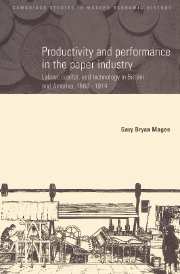 Productivity and Performance in the Paper Industry
Productivity and Performance in the Paper Industry Book contents
- Frontmatter
- Contents
- List of figures
- List of tables
- Acknowledgements
- List of abbreviations
- Introduction
- 1 Background
- 2 Technological change
- 3 Performance
- 4 Rags, esparto, and wood: entrepreneurship and the choice of raw materials
- 5 The Anglo-American labour productivity gap
- 6 Unions and manning practices in Britain and America
- 7 Raw materials, women, and labour-saving machinery: the Anglo-American gap, 1860–1890
- 8 Technological divergence: the Anglo-American gap, 1890–1913
- 9 Free trade and paper
- Conclusion
- Bibliography
- Index
Introduction
Published online by Cambridge University Press: 16 March 2010
- Frontmatter
- Contents
- List of figures
- List of tables
- Acknowledgements
- List of abbreviations
- Introduction
- 1 Background
- 2 Technological change
- 3 Performance
- 4 Rags, esparto, and wood: entrepreneurship and the choice of raw materials
- 5 The Anglo-American labour productivity gap
- 6 Unions and manning practices in Britain and America
- 7 Raw materials, women, and labour-saving machinery: the Anglo-American gap, 1860–1890
- 8 Technological divergence: the Anglo-American gap, 1890–1913
- 9 Free trade and paper
- Conclusion
- Bibliography
- Index
Summary
Nothing attracts the attention of historians, economists, and even the more astute of policy-makers, like the economic decline of once great and powerful societies. This is amply borne out by the plethora of theories accounting for the demise of inter alia Ancient Rome, Venice, Holland, Imperial China, and, in more recent times, America and the West in general. It is, moreover, an observation that seems to hold a fortiori when the declining society had once been the world's most dynamic. It is in this light that post-1870 Britain has come to be regarded by many.
That this should be so is hardly surprising. In the hundred years prior to the 1870s Britain had managed to break from the pack of rival European nations to command, what must have appeared to contemporaries, a seemingly unassailable lead in industrial production. The events of the nineteenth century, however, soon revealed that Britain's historic role was to be that of primus inter pares, not workshop of the world. By the turn of the century Britain was thus only one of several industrialised countries, albeit an important one. Increasingly British firms found themselves driven by foreign competitors from markets that they had once pioneered and dominated.
In many ways this was the experience of the British paper industry in the nineteenth century. From a situation at the beginning of the century where British papermakers were amongst the most advanced producers of paper in the world – a lead primarily won by their early introduction of the Fourdrinier paper-machine – the industry in the latter half of the century seemed to enter something of a relative decline, characterised by growing foreign import penetration and shrinking market shares.
- Type
- Chapter
- Information
- Productivity and Performance in the Paper IndustryLabour, Capital and Technology in Britain and America, 1860–1914, pp. 1 - 6Publisher: Cambridge University PressPrint publication year: 1997


